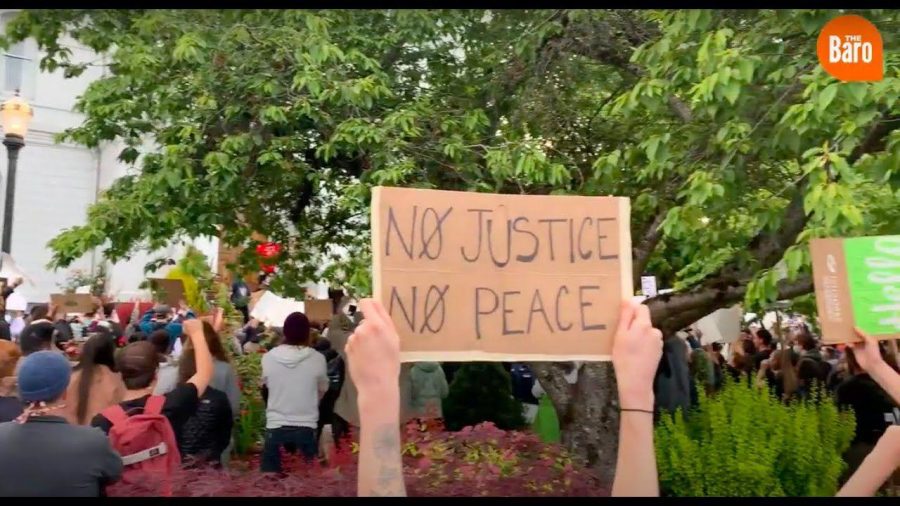Student-led peaceful demonstration puts Corvallis police, community on notice for violence against black people
June 1, 2020
Hundreds of Oregon State University students and Corvallis community members gathered in front of the Benton County Courthouse Sunday, May 31, to participate in a vigil for George Floyd and a demonstration protesting police violence toward black Americans.
Demonstrations are being held around the country in response to Floyd’s death in police custody in Minneapolis on Monday, May 25 after Derek Chauvin, a white police officer, held Floyd, an African-American man, on the ground for several minutes by placing a knee on his neck, even after Floyd became unconscious. The incident was captured on video and shared widely the following day, kicking off protests in Floyd’s home city which quickly spread across the country by the end of the week. Chauvin was fired and has been charged with third-degree murder and second-degree manslaughter. The other officers involved with the arrest have not been charged.
Sienna Kaske, an OSU ethnic studies student, was one of the organizers of the vigil and demonstration titled “Justice for Black lives: in solidarity with Minneapolis,” along with James Duncan II, Destiny Franklin, Ameer Fofanah, Xenia Velasco, Roman Cohen and Kobe Natachu, six OSU students, and Manju Bangalore, a University of Oregon graduate and activist.
Kaske, a longtime activist, said she reached out to the others on Friday when she saw there had not been a demonstration scheduled already. A smaller group of demonstrators gathered Saturday, May 30.
Kaske said she wants the Corvallis Police Department to receive diversity training and to listen, hear and act on the concerns raised by demonstrators, and to realize they are not going to stop fighting.
On Saturday, the Corvallis Police Department shared a joint statement on Facebook from the Oregon Association Chiefs of Police, Oregon State Sheriff’s Association and Oregon State Police condemning the tactics used by Chauvin that allegedly resulted in Floyd’s death.
“Corvallis should be scared because the people aren’t going to stand down,” Kaske said.
Kaske wants those who did not participate in the demonstration to think about why they chose not to, saying “Your silence kills.”
Kaske was pleased with the turnout and expected attendees to be loud. She said she hopes participants will continue their involvement after they go home, whether that means filming police interactions or buying a neighbor’s groceries.
Numerous speakers connected the demonstration to earlier eras of unrest, some feeling that nothing substantial has changed. Kaske said she believes her generation has learned from previous generations and will continue to fight until violence and discrimination are defeated.
The vigil portion of the event began with a mournful song sung by Genesis Hansen, an African-American whose arrest in October on charges of interfering with an Oregon State Police officer and resisting arrest, also captured on video, sparked controversy earlier this year. Those charges against Hansen, who was an OSU student at the time, were later dropped after the DA found them to have no legal basis, and OSP ended its contract with OSU.
After chants of “No justice, no peace”—which would become a refrain throughout the evening— OSU student Ameer Fofanah discussed the lack of empathy for black Americans he believes Floyd’s death indicates, as well as Fofanah’s long family history of activism in the Black Freedom Struggle.
“Every person I know has had the talk about how to be black in America… so they can survive in this nation,” Fofanah said. Fofanah spoke about his experience as a child hearing from his parents not to wear hoodies or keep his hands in his pockets when he was out, for fear of scrutiny from the police.
Chants of “Black Lives Matter,” another refrain heard throughout the demonstration, led into the next set of speakers, who called on attendees to remain conscious of racial discrimination at all times.
A later speaker, Duncan, called on people to join together and compared the violence seen at other demonstrations around the country to the explosive riots in Los Angeles after the controversial beating of Rodney King.
King’s severe beating at the hands of four L.A.P.D. officers was captured on camera and the four officers were tried on charges of police brutality. Three of the officers were acquitted and the jury failed to reach a verdict regarding the fourth, which was perceived by many as unjust, leading to riots which caused the death of more than 55 people and the destruction of 600 buildings. Two of the officers were later convicted on federal civil rights charges and King was awarded $3.8 million in damages.
A high point of tension during the Corvallis demonstration came when a man across the street from the courthouse repeatedly yelled “All lives matter” and “Everybody matters,” to which Duncan responded “He can’t shut me up” and many in the crowd attempted to drown the man out with more cries of “Black Lives Matter.”
According to Kaske, Sunday’s demonstration remained peaceful thanks in part to volunteer crowd managers who circulated to look out for suspicious or violent behavior. At least five people have been killed nationwide in violence connected with the Floyd protests, according to The New York Times.
Ricky Carson, who grew up in Corvallis, spoke next about local problems with racial discrimination, reminding attendees that the state of Oregon was founded for whites only and calling for policy change.
After the speakers were finished, Cohen, one of the event organizers, urged the crowd to kneel for five minutes of silence to honor the memory of black people killed by police officers. After the silent reflection, many of these names were chanted including Michael Brown, Breonna Taylor, Sandra Bland and Ahmaud Arbery.
Other call-and-response chants included “If we don’t get it, shut it down,” “End police brutality” and “When our communities are under attack, what do we do? Stand up fight back.”
The demonstration broke up a little before 8 p.m., after the final, loudest chant of “Black Lives Matter.”










































































































